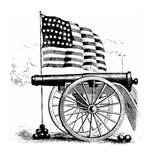
Salvaging Patriotism from the Narrow Nationalist
RESCUING TOLERANCE FROM THE ROOTLESS INTELLECTUAL
I remember the occasion well. It was a crisp summer evening long ago in Boulder, Colorado. A friend and I took in a guest lecture at the University of Colorado. The speaker, a confident, even smug British intellectual by the name and title of Sir Julian Huxley, scion of a well?known family, pronounced an anathema against the nasty superstitions of mankind — religion, nationalism, and atavisms of all sorts. He even predicted that within two decades — by 1984, curiously — religion would disappear altogether, simply evaporate in the wake of spreading Enlightenment. The oddity of national loyalty might linger just a bit longer.
I am pleased to report that I was skeptical.
Religion, of course, remains very much with us. Academics often have trouble acknowledging this. One might respond to their insouciance in this matter with Freud’s quip, “Theory is good but it doesn’t prevent things from existing.” Islam forcefully shapes the lives of hundreds of millions. The changes in eastern Europe are unthinkable without considering the moral power of Roman Catholicism. Eastern Orthodoxy is alive and well in Russia. Protestantism of the fundamentalist and charismatic sort is growing in Latin America. Indeed, religious forces of numerous varieties are profoundly affecting politics and society in countless areas of the world. Sir Julian Huxley, R.I.P.
If the academy ignores religion at its peril, and in the interest of promoting orthodoxies of its own, it does pay some attention to nationalism — but mostly in a tone best described as hand-wringing. For one of the signs of the rationalist orthodoxy is a marked disdain for particularist loyalties. Surely human beings will grow up and overcome these things! As everyone knows, such confidence in the overcoming of nationalism caught intellectuals and the Left altogether unprepared for World War I and scarcely less well-equipped for many conflicts since.
You May Also Enjoy
Today sensitivity is a virtue, stimuli are irresistible, environment is determinative, and we prefer our chicken frozen and wrapped in plastic.
Panegyrics for Archbishop Niederauer... Cardinal Levada Advises Priests to Cover Up Their Homosexuality... Another Neocon Is Pleased With the Document on Homosexuals In the Seminaries... "The Legionaries Aren't Rich"... Sock It To Us! Fling Us Into that Brier-Patch... Role Models... Do Peaceniks Really Believe "Peace Is Patriotic"?... "Don't Go After the Good Guys"
Christian teachers who feel overwhelmed can remember that, if they are using well the gifts God has given them, good things are being done amid their busy-ness.

